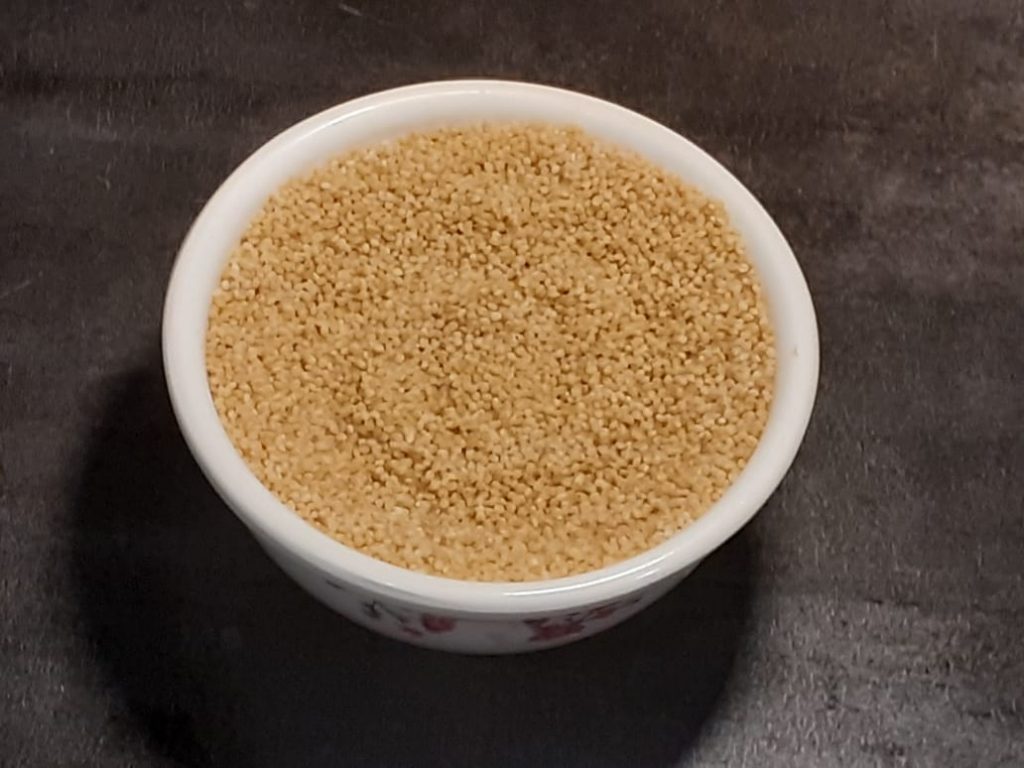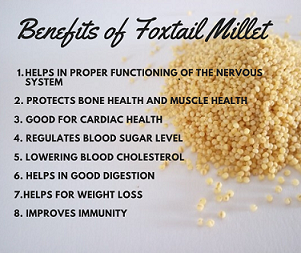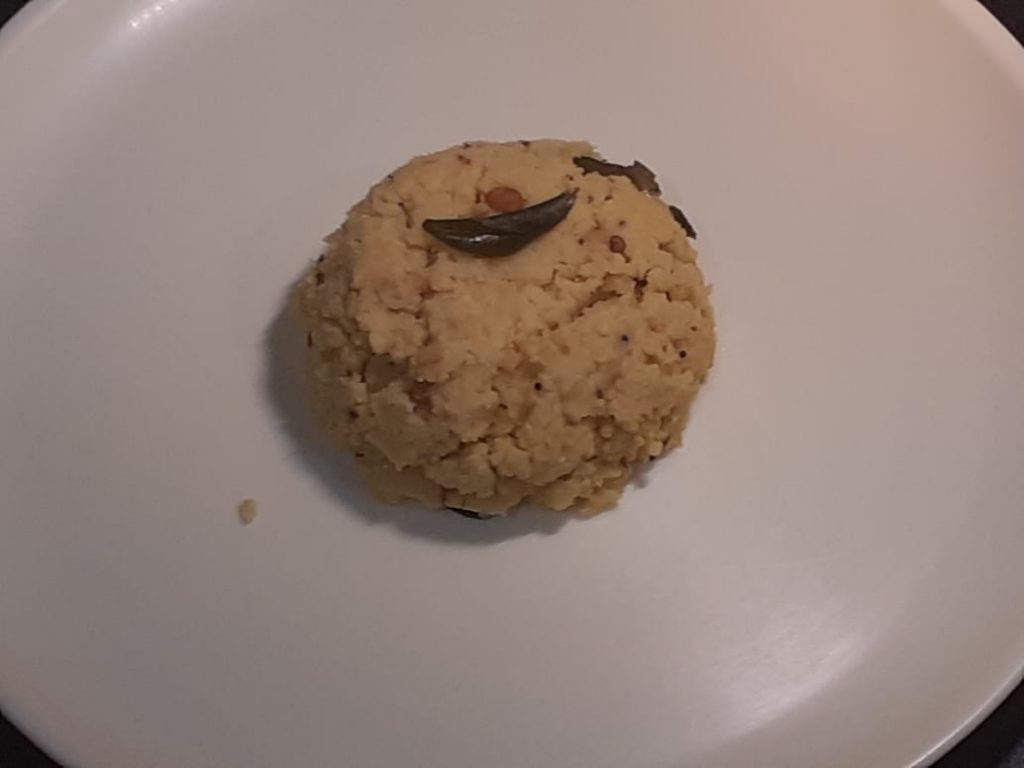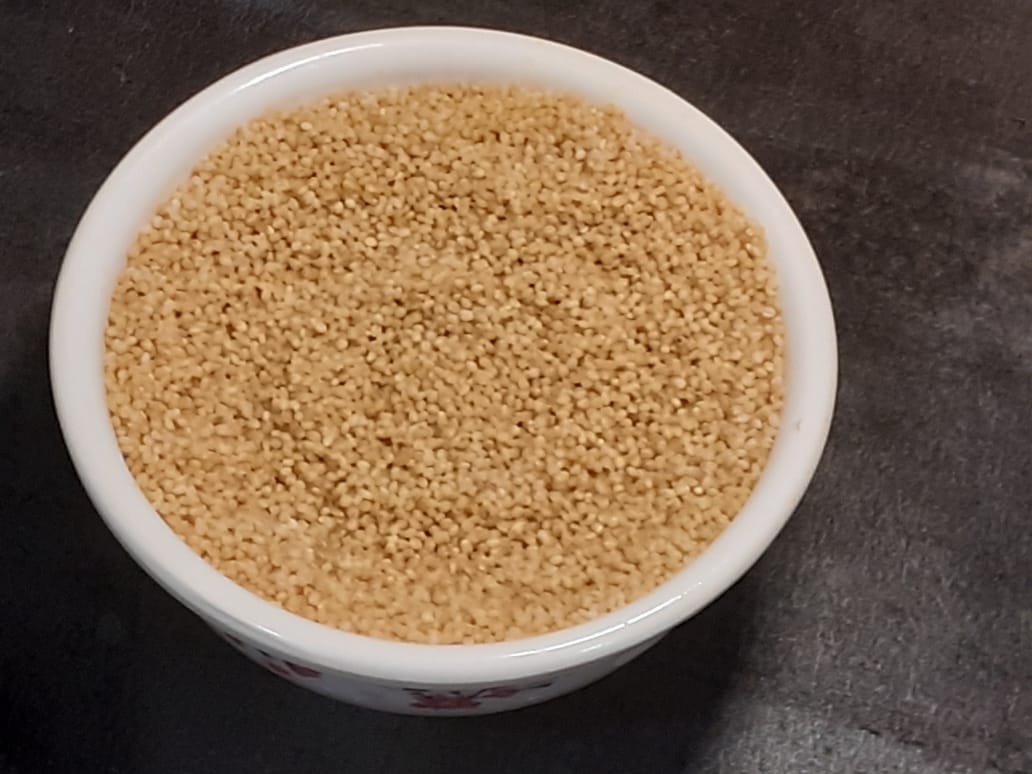Millet always got an upper hand when it comes to nutrition. Foxtail millet is one of the healthiest minor millet widely used in southern Indian states. In the hope of becoming fit, we start consuming whatever ‘super food’ is trending in the West (Quinoa, wheatgrass, cranberries, broccoli to name a few), ready to spend a bomb, and indifferent to the goodness of our own food. In this fast pace life, growing pollution in the air, a chemical sprayed vegetables, it is high time we bring changes to our regular diet to get immunity against communicable and non-communicable diseases. Encourage our locally grown seasonal grains to inherit immunity against local infections. Foxtail millet is one such local grain that you cannot ignore for its health benefits. (1)

Health Benefits of Foxtail Millets
1.Proper functioning of the nervous system
One of the most important functions of foxtail millet is maintaining good nervous health. Nowadays neural ailments are a serious concern for many including kids to adults. Fits in kids, nervous weakness, diabetic neuropathy which involves tingling sensations all over the body, burning sensation in the feet during night times, etc, infants unable to balance their head at 8 months, etc are some of the common nervous system ailments. The brain plays a crucial role in maintaining good neural health, diseases like Alzheimer’s, Parkinson’s, and Bells Palsy are some of the serious disorders due to brain function impairment.
Including Foxtail millet in your diet will help to overcome or avoid such neural weakness.
Vitamin B1 supplements are prescribed to slow down the development of Alzheimer’s disease. 100 grams of cooked foxtail millets contain 0.59 mg of vitamin B1. Consuming them will help Alzheimer’s patients. It also boosts concentration and memory power. More studies are being conducted on the same.
Vitamin B1 is also known as the Morale vitamin which provides a positive impact on the nervous system and supports mental perspective. It is helpful for Bel’s Palsy and Multiple Sclerosis patients. Including foxtail in the regular diet will improve the symptoms day by day.
Iron assists in brain development. It supplies oxygen to the brain, as it uses about 20% of blood oxygen. Iron is directly associated with brain functions. An adequate amount of blood is received by the brain helps to promote cognition and prevents Alzheimer’s disease and dementia. Due to this an adequate amount of iron is essential for brain oxygenation.
Protein helps in the functions of the nervous system smoothly. The activation of the nervous system triggers the response of relevant reactions. The receptor sites consist of a protein complex that helps to transfer the nerve signals to the cells and manage the central nervous system. (3, 4, 5, 6, 7)
2. Protects Bone health and muscle health
Foxtail millet is a good source of Iron and Calcium.
Iron is essential for the maintenance of the health of muscles. It is found in the muscle tissues and transports oxygen which is essential for muscle contraction. The deficiency of iron leads the muscle to lose elasticity and tone and may cause anemia.

Another severe impact of low levels of iron in the blood causes Restless Leg Syndrome which is associated with muscle spasms.
For good bone health Calcium and Phosphorous play a crucial role. It also helps in treating all kinds of inflammations in the bones. Arthritis, Spondylitis, and other bone inflammations can be overcome by including foxtail millet in your diet. Sprouted Foxtail millet helps to fight diseases such as osteoporosis at bay and could reduce the risk of fracture. (8, 9)
3. Good for Cardiac Health
Vitamin B1 assists in the formation of the neurotransmitter acetylcholine which helps to transfer the message between muscle and nerves. It also safeguards the functions of cardiac. The deficiency of Vitamin B1 leads to improper functions of the cardiac. Patients with congestive heart failure find Vitamin B1 helpful and prevent heart ailments. (10,11)
4. Regulates blood sugar level
Foxtail millets are rich in fiber content which is very essential in regulating blood sugar levels. The low glycemic index ( 50.8 ) of this millet is a very good alternative for diabetics low GI diet has been shown to reduce blood glucose levels, lipid parameters, and glycosylated hemoglobin. Foxtail millet Dosas, biscuits, and sweets can be the best alternative for people having fluctuating blood sugar levels. (12)
5. Lowering Blood Cholesterol
Foxtail millet contains amino acids (Lecithin and Methionine) which lessen the cholesterol level by driving out the excess fat from the Liver. Foxtail Millet also contains amino acid (Threonine) which hinders the formation of fat in the liver, which makes the cholesterol level of the body sink. (13,14)
6. Helps in Good digestion
As it’s a good fiber source it helps in curing constipation in kids as well as adults. Include more vegetables and fruits along with foxtail millet to overcome constipation. Foxtail Millet is a gluten-free grain hence it is a very good option for celiac patients and gluten intolerant people. (15, 16)
7.Helps for weight loss
Foxtail contains an amino acid (Tryptophan) which will trim your appetite and help to tighten your belly. Foxtail millet gets digested at a slower rate thus keeping one away from taking extra calories. The fibers present in foxtail millet give a feeling of fullness which helps to control excessive food consumption.
8. Improves Immunity
As we have seen that Foxtail millet is a good source of many vitamins and minerals it helps us build strong immunity. Good immunity helps us to fight against many diseases spread by microorganisms. It also helps us to recover fast from serious illnesses.

What are foxtail millets?
Foxtail millet, Scientific name Setaria italica is an annual grass from the Poaceae family. It is the second most widely planted species of millet. It has the longest history of cultivation among millet, having grown in India since ancient times. It is a staple diet in many southern states. It is cultivated mostly in India, China, Africa, and a few parts of Australia, Europe, and America.
Like other millets, Foxtail Millets can be cultivated in Harsh climates with limited inputs. It can withstand high temperatures with minimum rainfall. It can be harvested within 90 days from the time seed is sown. It is a spring season crop. (2)
How does Foxtail Millet looks like?
Foxtail millets are small oval or elliptical seeds. They are yellow. Sometimes, it is mistaken as yellow mustard seeds. The seed head of this plant looks like the bushy tail of a fox, hence it got the name, Foxtail Millet.
The other names of Foxtail millets are Italian millets, Kangni in Hindi, Korralu in Telugu, Thinai in Tamil, Navanakki in Kannada, Kaon dana in Bengali.
In India, the foxtail millets cost is around 100/kg. Due to an increase in demand compared to the supply this millet is slightly expensive.
Nutritional Value of Foxtail Millets
Along with the below-mentioned macro and micronutrients, Foxtail millet also has vitamins like carotene, Thiamine (Vitamin B1), Niacin, and minerals like magnesium, Sodium, Potassium, chlorine, and Zinc in traces.
Values per 100 grams of edible portion
| Moisture | 11.2 grams |
| Proteins | 12.3 grams |
| Fat | 4.3 grams |
| Carbohydrates | 60.9 grams |
| Crude Fibre | 8 grams |
| Minerals | 3.3 grams |
| Calcium | 31 mg |
| Phosphorous | 290 mg |
| Iron | 2.8 mg |
| Energy | 331 kcal |
Reference – Nutritive Values of Indian Foods, NIN by C.Gopalan, B.V.Rama Sastri, and S.C.Balasubramanian.

Want to buy foxtail millet online?
How much Foxtail millet is safe to be consumed?
Food is food.Period.There is nothing like magic food that will cure diabetes, cardiovascular diseases, obesity, cancer, etc in one go. To have good physical and mental health it is very essential to have a properly balanced diet and regular exercise and meditation. Include a variety of local and seasonal grains, vegetables, fruits, essential oils in your diet to have a healthy life.
You can include foxtail millet 2 -3 in a week. Do not completely switch over to one kind of grain.
Points to remember while including millets
- Wash thoroughly the millet 4-5 times and soak for 3 hours before cooking.
- Do not mix up 2-3 millet for making a millet cuisine.
- Do not eat different kinds of millet on the same day. As it will generate more heat in the body it is important to hydrate yourself through the day.
Side effects of Foxtail Millets
- Some people experience throat irritation due to husk on the millet. If any such symptoms is experienced please avoid the Foxtail Millets.
- Millets have goitrogens which can lead to hypothyroidism. Overconsumption of millets may impair the function of the thyroid gland. People who are diagnosed with hypothyroidism must avoid Foxtail Millets. Flavonoid compounds like apigenin, luteolin, vitexin impair iodine uptake by the thyroid gland which essential for the proper functioning of the gland. (17,18)
Conclusion
Foxtail millet is a versatile grain that is super good for everyone and a fantastic source of calcium, magnesium, B-vitamins, and other vital nutrients. These super grains are an integral part of our local and traditional food cultures that have been growing since ancient times and they consume much fewer resources to grow when compared to rice, wheat, etc. Including more millets in our diet not only embraces a healthy and fit life but we also end up doing a lot of good for Mother Earth! Consuming in moderation will provide us with many foxtail health benefits without their side effects.





